The Government believes that focusing on key ‘building blocks’ will build students’ confidence and motivation, but some teachers fear that cultural topics and themes could be squeezed from the curriculum.
The school curriculum for French, German and Spanish is to be overhauled in England so that teenagers focus on learning a set of up to 1,700 frequently used words, the Government has announced.
The plans are designed to make the subjects “more accessible and attractive” to arrest a slump in language learning, but some teachers have said the changes will make the GCSEs “prescriptive and grinding”.
In March last year the Government announced proposals to reform modern foreign language GCSEs.
Publishing the results of a consultation on Friday, the Department for Education said that the new syllabuses would focus on the most common vocabulary used in conversations and writing, as well as grammar and pronunciation.
The new courses will be taught from 2024, with the first exams being held in 2026.
Pupils will be assessed on the basis of 1,200 “word families” for the foundation tier GCSE, and a further 500 word families for the higher tier.
An example of a word family could be “manage”, “managed” and “manages”, with 85 per cent of these word families drawn from the 2,000 most frequently occurring words.
The Government believes that focusing on these “building blocks” will allow students to more clearly see their progress, growing their confidence and motivation.
However, a number of education groups have already said they are “disappointed” with the changes.
Geoff Barton, the general secretary of the Association of School and College Leaders, said: “We fear that rather than encouraging the take-up of languages, a curriculum which mainly focuses on memorising a long list of words will alienate pupils and prove counterproductive.
“At a time when pupils need to be enthused to learn languages, the Government has chosen to make GCSEs both prescriptive and grinding.”
Professor René Koglbauer, chair of the Association for Language Learning, told i that “high frequency words definitely have a place to play”.
However, he said that language teachers feared that the focus on these words could result in cultural topics and themes being squeezed out of the curriculum.
He said: “If we are given restrictive word lists, could that have a potential demotivating aspect in terms of the learning experience… if the focus is on these word lists?”
Simon Hyde, general secretary of the Headmasters’ & Headmistresses’ Conference group of private schools, said: “HMC members fear that the narrow focus of these proposals confirmed today will not arrest the declining numbers wishing to study languages.”
This article was first published by The Independent on Friday 14th January 2022, and you can read the article in full here.
